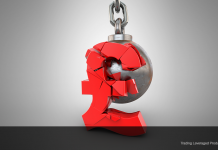The GBPUSD hit its weakest point since March 2020 at 1.1759 on Thursday as risk aversion made investors more confident in the US Dollar and they dumped currencies deemed riskier due to their uncertain outlook. Even though the BOE has raised interest rates repeatedly, the Pound has remained weak so far this year. The spike in interest rates in various parts of the world to contain inflation has created concerns for traders and investors, who ultimately prefer the reserve currency, the US Dollar, as a more liquid hedge.
This week’s higher-than-expected US inflation reading has fueled speculation on the possibility of a 100bp rate hike this month, creating a market shock. The potential shift to a 1% hike from the Fed caused by the recent CPI data, coupled with energy-driven geo-politics, is enough to push the US Dollar higher. This will slow economic growth in the world’s largest economy while raising the cost of money worldwide.
Atlanta Federal Reserve Bank President Raphael Bostic said “everything is in the game” when asked about a 100bp hike later this month. San Francisco Federal Reserve Bank President Mary Daly said that she favored a 75bp hike, but that 100bp would now be on the table given the inflation shock. Federal Reserve Bank of Cleveland President Loretta Mester said she was unwilling to rule out a 100bp move. Federal Reserve Bank of Richmond President Tom Barkin said inflation should be the Fed’s full concern and he wants to see positive real interest rates in the next few years.
Commodities dragged lower and equity bleeding has not stopped, reflecting recession expectations. Traders are also concerned about the UK and European economic outlook with inflation rising steadily higher than elsewhere. The soaring price of natural gas and its impact on the regional economy has affected the exchange rate of the Pound and the Euro simultaneously. Plus uncertainty about who will replace Boris Johnson and the economic policies they will pursue still looms over the exchange rate.
The Euro exchange rate has fallen below parity (touched 0.9950 yesterday) amid surging US Dollar demand and capitulation of buy orders around 1.0000. The Euro is under special scrutiny, as ongoing concerns over the future of gas supplies from Russia increase. JP Morgan this week revised its EURUSD forecast in response to recent market developments and said the single eurozone currency will remain under pressure amid Europe’s gas crisis which is far from over.
If Russia implements its threat to end exports of gas to the EU, the Euro could suffer heavy losses given that JP Morgan anticipates the Euro-Dollar exchange rate reflects a 20% to 25% chance of a total close. ⌊1⌋
Click here to access our Economic Calendar
Ady Phangestu
Market Analyst – HF Educational Office – Indonesia
Source : (1) financial times
Disclaimer: This material is provided as a general marketing communication for information purposes only and does not constitute an independent investment research. Nothing in this communication contains, or should be considered as containing, an investment advice or an investment recommendation or a solicitation for the purpose of buying or selling of any financial instrument. All information provided is gathered from reputable sources and any information containing an indication of past performance is not a guarantee or reliable indicator of future performance. Users acknowledge that any investment in Leveraged Products is characterized by a certain degree of uncertainty and that any investment of this nature involves a high level of risk for which the users are solely responsible and liable. We assume no liability for any loss arising from any investment made based on the information provided in this communication. This communication must not be reproduced or further distributed without our prior written permission.



















